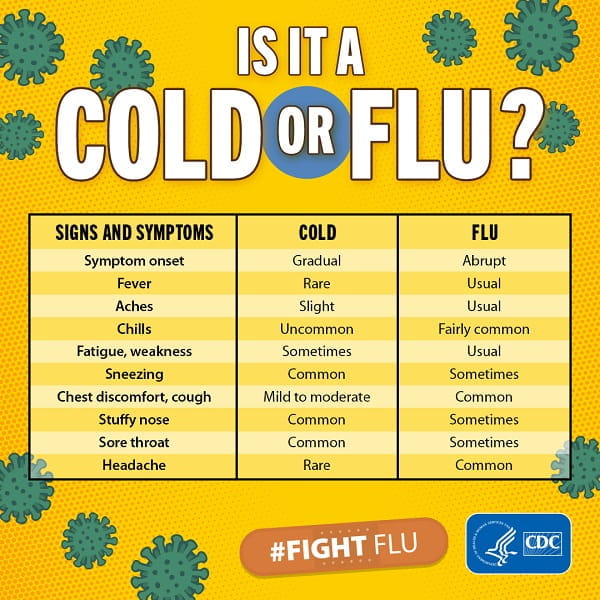The web Browser you are currently using is unsupported, and some features of this site may not work as intended. Please update to a modern browser such as Chrome, Firefox or Edge to experience all features Michigan.gov has to offer.
Flu Basics
What is Flu?
Influenza (flu) is a contagious respiratory illness caused by influenza viruses that infect the nose, throat, and lungs. It can cause mild to severe illness and at times can lead to death. CDC estimates that influenza results in 9 million to 45 million illnesses, 140,000- 810,000 hospitalizations, and between 12,000 and 61,000 deaths every year. Influenza is not the “stomach flu” and is also different from the common cold.
Flu Symptoms
Influenza (flu) can cause mild to severe illness, and at times can lead to death. Flu is different from a cold. Flu usually comes on suddenly. People who have flu often feel some or all of these symptoms:
- fever* or feeling feverish/chills
- cough
- sore throat
- runny or stuffy nose
- muscle or body aches
- headaches
- fatigue (tiredness)
- some people may have vomiting and diarrhea, though this is more common in children than adults.
*It’s important to note that not everyone with flu will have a fever.

Diagnosing Flu
It is very difficult to distinguish flu from other viral or bacterial respiratory illnesses based on symptoms alone. There are tests available to diagnose flu. Your respiratory illness might be the flu if you have fever, cough, sore throat, runny or stuffy nose, body aches, headache, chills, and/or fatigue. Contact your health care provider if you are having severe flu symptoms or are at high-risk of flu complications.
Individuals at High Risk of Flu Complications
Some individuals are more likely to get flu complications that can result in hospitalization and sometimes death.
Specific high-risk groups include:
- Adults aged 65 years and older
- Children younger than 5 years of age, specifically those younger than 2 years
- Pregnant women
- Individuals with chronic health conditions including asthma, heart disease and stroke, diabetes, HIV/AIDS, cancer, children with neurologic conditions
The CDC has more information about individuals at high-risk for flu complications.
Transmission (Spread) of Influenza
Influenza viruses are spread when a person who has influenza coughs, sneezes, or speaks which releases viruses into the air where other people can inhale the viruses. When these viruses enter the nose, throat, or lungs of a person, they begin to multiply, causing disease. The viruses may also be spread when a person touches a surface with flu viruses on it and then touches their nose or mouth.
Individuals are able to spread the flu before they are sick, as well as while they are sick. People with flu are most contagious in the first 3-4 days after their illness begins. Some adults are able to infect others beginning as soon as 1 day before symptoms develop and up to 5-7 days after becoming sick.
Preventing Influenza
Everyone aged 6 months and older, who does not have a medical contraindication, is recommended to receive an annual flu shot.
Take Three Actions to Prevent Flu Every Year
- Take time to get the flu vaccine. The single best way to prevent flu is to get vaccinated every year.
- Take every day preventative actions.
- These include:
- Avoiding close contact with other people who are sick and stay home when you are sick.
- Cover your mouth and nose with a tissue when coughing or sneezing.
- Wash your hands often with soap and water for at least 20 seconds. If soap and water is not available, use alcohol-based hand sanitizer.
- Avoid touching your eyes, nose, or mouth.
- Practice other good health habits including getting plenty of sleep, clean and disinfecting frequently touched surfaces, drinking plenty of fluids, and eating nutritious foods.
- Take flu antiviral drugs if your doctor recommends them.
For more information, visit our prevent flu webpage.
What to Do If You Get Sick This Flu Season
If you get sick with the flu you should first stay home and avoid contact with other people except to seek medical care. You should get plenty of rest, drink a lot of fluids, and avoid using alcohol and tobacco.
If your flu symptoms are severe (trouble breathing, chest pain, seizures, persistent dizziness, fever above 104 degrees Fahrenheit, etc.) you should contact your health care provider and seek care right away.
If you are at high-risk of flu complications (see above), you should consult your health care provider when your flu symptoms begin. Remind them about your high-risk status for flu. CDC recommends that people at high risk for complications should get antiviral treatment as early as possible, because benefit is greatest if treatment is started within 2 days after illness onset.
Treatment for Flu
If you get sick with flu, antiviral drugs may be a treatment option. Contact your doctor promptly if you are at high-risk of serious flu complications and you get flu symptoms. Antiviral drugs can lessen symptoms and shorten the time you are sick. They can also prevent serious flu complications, like pneumonia.